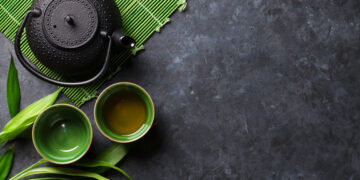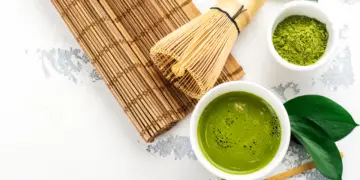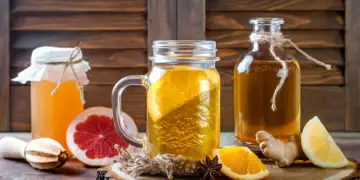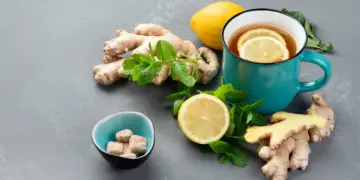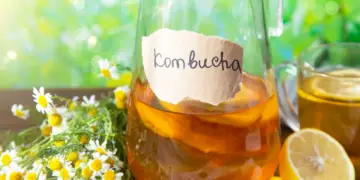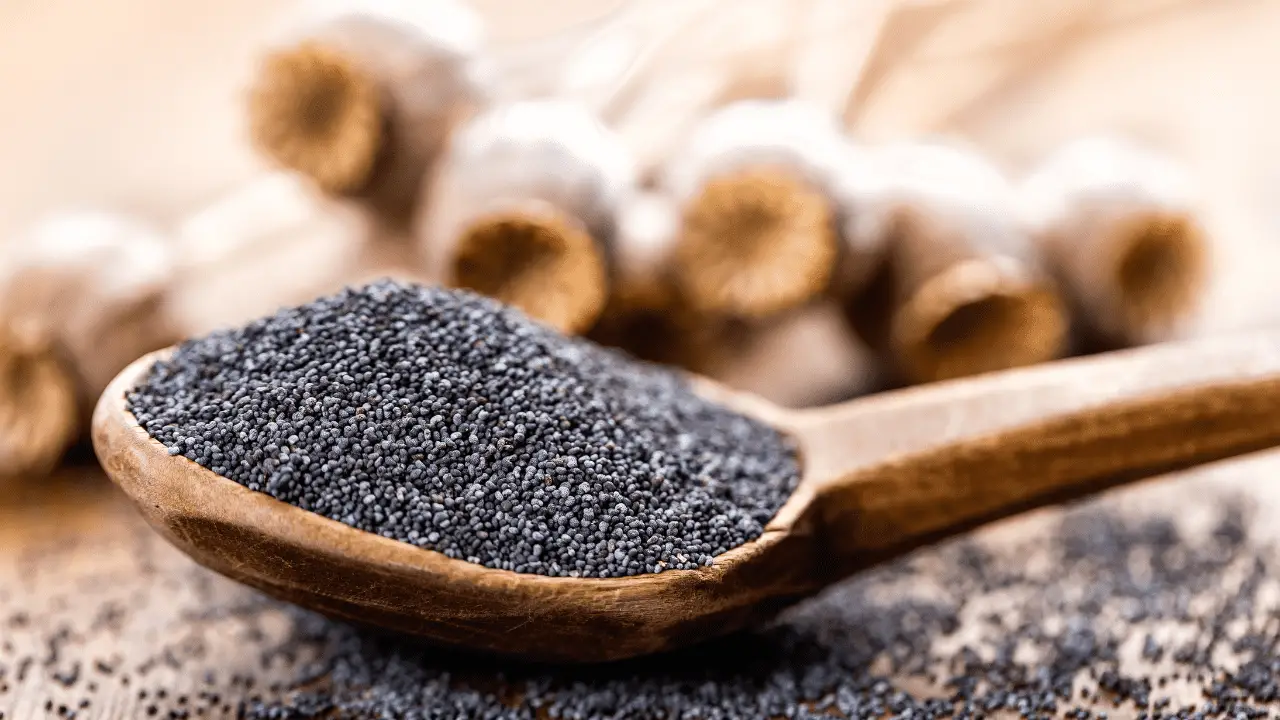A mug of steaming tea is one of the most commonly dispensed home remedies for a sore throat. Even doctors recommend consuming warm drinks when you have a sore throat. There really is nothing more soothing than a nice, warm beverage, especially when you’re not feeling your best.
A sore throat can be really painful and discomforting. In some cases, you may even experience pain while swallowing food. So the question is: is tea really effective for a sore throat? Can a simple cup of tea deal with such issues? If yes, what are some teas that are effective for sore throat treatment? In this article, we will expand on all of these questions.
A warm drink like tea can be a good option for sore throat pain relief as tea contains numerous antioxidants and therefore anti-inflammatory. The warmness of the beverage can dilate the blood vessels in the throat, thereby lessening pain.
- The Science Behind Why Tea Helps With a Sore Throat
- 7 Best Teas For Sore Throat
- How To Prepare The Perfect Cup For A Sore Throat
- Is Too Much Tea A Bad Thing?
- Conclusion
The Science Behind Why Tea Helps With a Sore Throat
Tea is often used as a home remedy for the treatment of sore throat, and many would agree that, based on their personal experience, it really works. However, there aren’t any scientific studies that directly state “tea reduces the pain of a sore throat”. But we can look at the properties of a hot cup of tea and connect the dots on why it works.
- First of all, tea is a great antioxidant. This means it has the ability to reduce inflammation. Sore throat occurs when there is inflammation in the pharynx, the space after the mouth and before the esophagus and trachea (windpipe). The antioxidant effect of tea could be one important factor in treating a sore throat.
- Secondly, the warmth of the tea soothes the throat and loosens up and clears out mucus. This helps to reduce coughing and irritation in the throat.
- Finally, warm liquids dilate the blood vessels of the throat. Dilated blood vessels means an increased blood supply, which in turn means faster healing.
So, even though we don’t have any direct studies stating tea helps with sore throat and cough, these reasons could be the possible mechanisms behind why tea helps with a sore throat.
If we have convinced you to give teas a try, here are our recommendations on the best teas for a sore throat!
7 Best Teas For Sore Throat
1. Tea with Honey

This is the easiest on the list, because whatever you have at home works! Green tea, black tea, oolong tea, or any other variety of tea, as long as it contains actual tea leaves, will have anti-inflammatory properties.
Prepare your tea and add one tablespoon of honey. Honey also has anti-inflammatory action and is proven to reduce cough. In fact, some studies suggest that honey might actually be better than a drug called diphenhydramine (sold under the brand name Benadryl) when it comes to treating cough.
The combination of tea and honey might give you a superior result in promoting the reduction of your sore throat.
2. Ginger Tea or Tea With Ginger

Ginger also ups the nutritious benefits of tea. This root is well known to help with a sore throat. The chemical compounds of ginger are proven to be anti-inflammatory in nature. There is even evidence that it has anti-bacterial, antiviral, and antifungal effects!
Studies suggest that it can help with the symptoms of both pharyngitis and acute tonsillitis.
So, if you have fresh ginger in your kitchen, add it to your sore throat tea. Chop up a piece of ginger and boil it with the water you will use to steep the tea. Doing this will extract the ginger juice. Steep your tea in it and enjoy. Alternatively, you could use a ginger extract or even powdered or dried ginger.
If you rather buy your tea than bother making it, we suggest the following:
Best loose leaf: Rishi Loose Leaf Turmeric Ginger tea
Rishi has many other blends with ginger, but this one has that combination that improves our spirit! It’s one of the best loose leaf varieties out there and has a spicy ginger taste and a zesty note.
Best tea bag: Prince of Peace Ginger tea
If you prefer a more toned-down flavor, this is more balanced with the perfect blend of sweet and spicy, making it more suitable for most tea drinkers.
3. Chamomile Tea
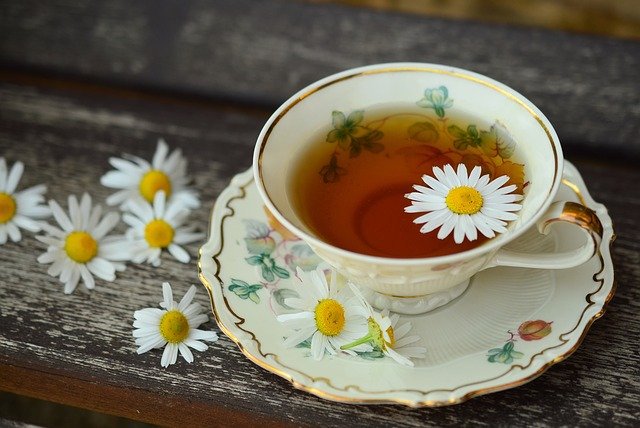
Chamomile is yet another anti-inflammatory edible flower. Sodium azulene sulfonate, a natural anti-inflammatory component of Chamomile tea, is clinically used for pharyngitis and tonsillitis.
It also improves immunity and fights off the infection that caused your sore throat, as well as relieves the pain brought on by a sore throat. If you have an associated cold, then breathing in the steam of chamomile extract in hot water can help reduce overall common cold symptoms.
We recommend keeping Chamomile in your cabinet, especially during flu season. Here are our top recommendations:
Best loose leaf: The Tea Company Organic Chamomile Tea with Whole Dried Flowers
The chamomile flowers in this brand are organic, non-GMO, with no additives. It has an earthy and natural taste to it. This particular package can make an average of 60 cups, but you can further extend that depending on your use. As a bonus, this is one of the more affordable loose tea you can get!
Best tea bag: Traditional Medicinals Organic Chamomile Herbal Tea
This brand is best for newcomers to tea drinking. It’s got a fragrant, floral taste with traces of honey. For those of you who like to know where your food comes from, here is a fun fact: They use fresh flowers for your tea sourced from Egypt.
4. Elderberry tea
Elderberry tea is another great option. Elderberry is a deep purple-colored berry that is derived from the European Elder Tree. It is another plant that has been a part of traditional medicine for generations. Hippocrates even referred to the elderberry tree as “nature’s medicine chest”.
Studies have shown that Elderberry is effective in reducing the severity of symptoms of the common cold, including sore throat and cough. It also significantly reduces the duration of a cold, helping you to return to life more quickly.
So if your sore throat is accompanied by the common cold then elderberry tea might be a better option for you. It will also reduce other associated symptoms like headaches, chills, nasal discharge, nasal obstruction, and other undesirable side effects.
For the shoppers that are down with the Elderberry, here are our recommendations:
Best loose leaf: Rishi Elderberry Healer
This blend mixes many other sore throat soothing herbs, such as ginger root, hibiscus flowers, licorice root, and grapefruit oil. As for the taste, the tea doesn’t taste too strongly of Elderberry but has a hint of sweetness.
Best tea bag: Budhha Teas Organic Elderberry Tea
Unlike its loose-leaf counterpart, this organic tea only has Elderberry as an ingredient. So that flavor comes off heavy with this one. It has an earthy smell, a strong elderberry taste, but a subtly sweet finish. If you love Elderberry, try this!
5. Cinnamon Tea
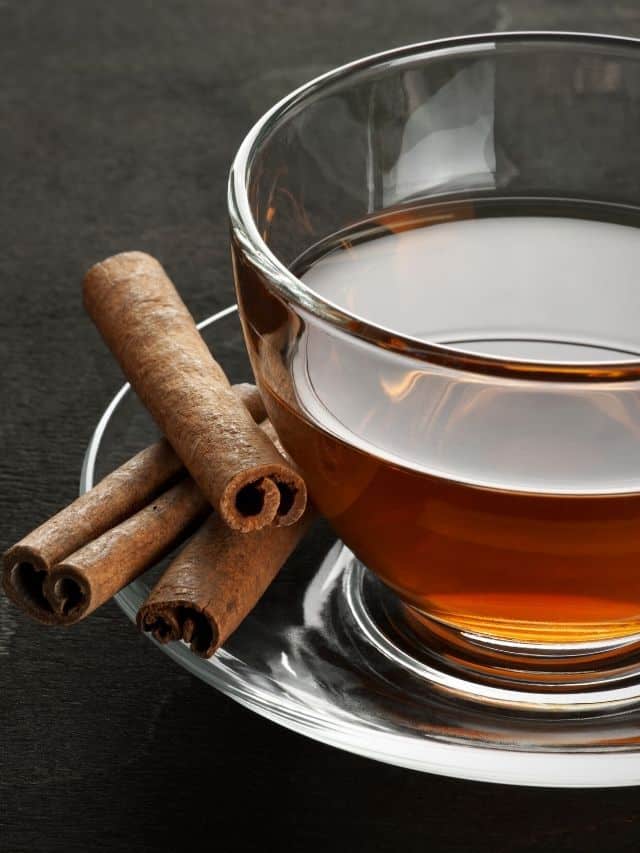
If you don’t mind a little bit of spice in your tea then cinnamon tea might be a great option for you. It’s a tea made from the dried bark of the cinnamon tree, and may or may not be mixed with tea leaves and other herbs or spices. Alternatively, cinnamon tea can be made by adding cinnamon extract or dried cinnamon to your black tea.
Cinnamon is a delicious spice with health benefits ranging from preventing cancer to preventing Alzheimer’s disease. It also has antimicrobial and anti-inflammatory properties and is therefore beneficial for the treatment of sore throat.
If you want to buy your tea instead of just adding cinnamon to your tea, we suggest grabbing a box of the following cinnamon tea blends:
Best loose leaf: Vahdam Sweet Cinnamon Masala Chai
This blend based on India’s Masala Chai is a combination of Assam tea with cinnamon and cardamom. The spiced black tea is sealed fresh 72 hours from harvest to ensure maximum freshness.
Best tea bag: Harney & Sons Classic Hot Cinnamon Spice
Harney & Sons’ Cinnamon tea is one of their bestselling products, and for a good reason. Their Classic Hot Cinnamon Spice is a blend of black tea, orange peel, cloves, and three different types of cinnamon. It’s sugar-free and has a strong scent of citrus and spices. Its tastes like black tea, with a hint of sweetness and spice.
6. Peppermint or Mint Tea

Peppermint and other herbs in the mint family are great if you’re looking for something to soothe your throat. Attributed to menthol, these herbs leave behind a cooling sensation in the throat. But that’s not all they do!
Menthol is an anti-bacterial, anti-viral, and antifungal agent. It also has analgesic properties. It can, therefore, help in reducing throat pain, and kill off some bacteria and viruses causing sore throat, relieving the symptoms of sore throat.
Peppermint is a hybrid mint herb. Other herbs in the mint family include spearmint, orange mint, pineapple mint, and chocolate mint. You can use whatever is more easily available to you, in either fresh or dried form. Try a combination of several types of mint for a lovely, aromatic, beneficial mint tea.
If you are in search of minty teas we suggest the following:
Best loose leaf: Frontier Co-op Peppermint Leaf
This loose leaf tea is all organic, natural, and sourced from the US. Their products are top-quality, and they ensure their process is entirely environmentally friendly.
Teabag variety: Traditional Medicinals Organic Peppermint Herbal Leaf
Again this is all organic, with no additive or other flavors. It is simply organic peppermint leaves in the tea bags. Consequently, the aroma and taste are a pretty strong minty flavor. If you love mint, then this might be for you!
7. Oregano Tea
Oregano tea is a bit more savory than the other teas we’ve discussed but could be a nice addition to your tea regimen. This herb is scientifically proven to have anti-inflammatory and anti-viral activity. Apart from that it also has an analgesic effect that can help relieve your sore throat pain.
You can have it in several ways. You can either get oregano extracts that you can add to your tea, or you can steep fresh or dried oregano leaves in hot water with your tea.
That said, if you want to give it a buy a premade tea anyway, we suggest buying Buddha Teas Organic Oregano Tea. This particular tea has a robust and distinct scent that is, well, very oregano-y. As an oregano fanatic, I find the flavor well-rounded and appealing. It is overall a light non-caffeinated tea with high thymol content.
How To Prepare The Perfect Cup For A Sore Throat
Boil some water in a pot or in a tea kettle, add your favorite tea (loose leaves or already bagged), and let the tea soak (steep) in the water for 10 minutes. You can leave it for a bit longer if you desire a stronger tea, but be mindful that tea can turn bitter if it steeps for too long. Drain the leaves or remove the bags, et voila! Your tea is ready.
You can similarly steep fresh herbs like peppermint, mint, oregano, and ginger to make your tea even more effective.
You can go with loose tea leaves or tea bags; both should yield equal results. You can get pre-made herbal tea or you can mix the spices, herbs, and flowers of your choice separately in your black or green tea. Either way is fine. You can even mix multiple different herbs and spices. Experiment and find out what you like the most.
Adding a tablespoon of honey would be a good idea to supplement your tea with an extra anti-inflammatory boost.
Is Too Much Tea A Bad Thing?
While tea and herbal teas are in general pretty safe, herbs may possess some underlying side effects and drug interactions. These side effects are not usually apparent when consumed in moderate amounts, but can cause serious injury to your health if consumed in higher doses. Be careful before using any herb at a very high dose if you are under any long-term medication to prevent complications like treatment failure.
Caffeine-containing tea leaves have their own set of side effects like anxiety, insomnia, and increased heart rate and blood pressure. This might be a good reason to choose a decaffeinated version.
Also, keep in mind that herbs may cause allergic reactions in some people. If you have a known allergy to any of the herbs or if consumption of even a small amount of herbal tea causes discomfort, discontinue the use of that herb immediately.
Conclusion
Sore throat is something that all of us experience, especially with climate change. Most of the time it’s not a serious issue and usually, your body takes care of it by itself without any medications.
After analyzing the benefits of these herbs and flowers we can safely assume that drinking certain types of tea can yield better and quicker results, rather than doing nothing and waiting for spontaneous healing.
Drinking tea when you have a sore throat will also ensure that you stay hydrated. Sore throat is very commonly accompanied by fever. Fever is one of the common causes of dehydration. So, you must keep an adequate intake of fluids, and tea could be a great supplement.
Simple tea and honey are good. But if you fancy some extra added benefits of herbs, you can always experiment a little and find out the best combination for your taste.
Finally, seek professional treatment if your cough doesn’t improve in a week, or if you develop other symptoms like high fever, chills, difficulty in breathing, or ear pain.


